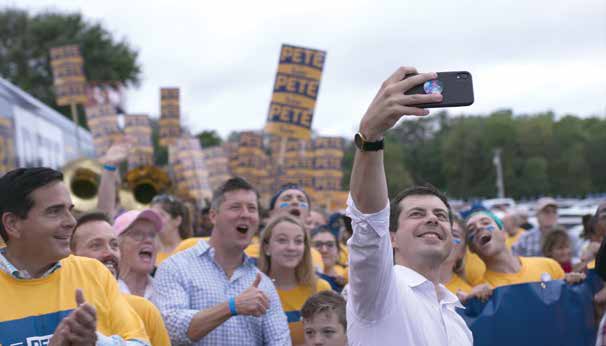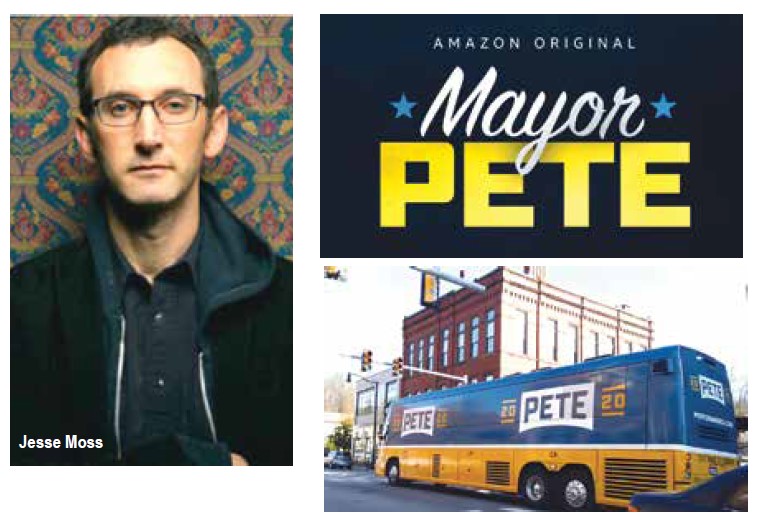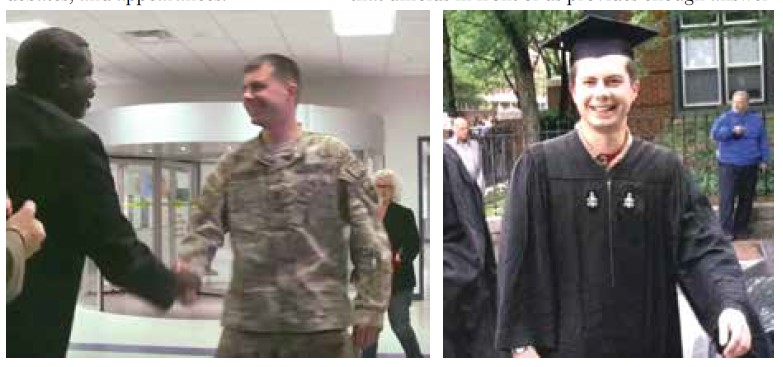
By Gary M. Kramer–
Jesse Moss’ documentary, Mayor Pete, featured in the Frameline Fall Showcase on November 11 at the Castro Theatre and out November 12 on Amazon, follows the first out gay presidential candidate, Pete Buttigieg, and his spouse Chasten on the campaign trail. The film combines interviews with Buttigieg with fly-on-the-wall footage of his efforts on the ground in Iowa for the caucuses to his various stump speeches, debates, and appearances.
Moss focuses on Buttigieg’s sexuality, and his messages of belonging, which extend beyond the gay community. Mayor Pete also addresses issues of race and privilege that dogged Buttigieg’s campaign (as well as his time as mayor of South Bend, Indiana). In a recent Zoom interview, Moss chatted with me for the San Francisco Bay Times about Buttigieg and his new documentary, Mayor Pete.

Gary M. Kramer: How much access to Secretary Buttigieg did you have while making the film?
Jesse Moss: We started filming in March 2019 and wrapped right before Super Tuesday, when he dropped out and endorsed Biden. We shot a postscript interview with him in fall 2020 before the election. And we did another shoot with him in D.C. after he got appointed [to be the Secretary of Transportation].
Gary M. Kramer: At the beginning of the film, Chasten suggests you talk with Pete about achieving. Can you talk about that? It shows how you gained insight to Pete through his husband.
Jesse Moss: To me the question that Chasten frames—that he is asking which is after the campaign is over—is for Pete to answer. But the story that unfolds in front of us provides enough answer for the audience to decide for themselves, was Pete able to be his authentic self or not? And what does that really look like? I don’t think there is a definitive yes or no. I like that it’s Chasten who poses the question. I think Pete provides the answer in the story that we see unfold in front of us. There were questions I put to Pete that he struggled to answer or couldn’t answer then. Maybe he could answer them now. Sometimes it would depend on the day how open he was. What I found that it was powerful to hear him talk about being closeted as a young man growing up in South Bend, and I want to see those things lived in real time in front of us, and sometimes that leaves questions unanswered, or leaves only fragments for us to consider, but that is OK.

Gary M. Kramer: You include several episodes of Pete being grilled about race and white privilege. I like that you show both sides of the issue, and why Pete lacked traction with the Black community. What are your thoughts on that flaw in his campaign?
Jesse Moss: It’s hard to know what’s a flaw and what’s a structural challenge a candidate faces and what challenges arise from conditions in the body politic and the country, and what are rooted in the candidate’s own mistakes or weaknesses. In hindsight, it is inevitable that race has become such an important dimension to the story, which was before the death of George Floyd and the rise of the Black Lives Matter movement, but it anticipates that and the challenge of the party of knitting together the fractious forces and groups.
If you are a white candidate in this moment, how are you reaching out to and connecting with Black voters? He was working with the community in South Bend, but the [police] shooting was a nightmare scenario. [It was a] raw, unvarnished, and kind of existential challenge to his campaign, to see him deal with it head on and take criticism for it. This was part of Pete’s coming of age and dealing with the racial reckoning that we as a country are dealing with it; Pete processing it as we all are processing it. He has his unique responsibilities as the mayor of a community with a large African American population and as someone who is asking the country to elect him president so he can deal with these problems. Pete will be the first to say he has a lot to learn.

Gary M. Kramer: Mayor Pete will certainly interest political junkies. What are your thoughts about showing the behind-the-scenes innerworkings of Pete’s campaign?
Jesse Moss: What was interesting to me about debate prep is not the nuts and bolts but the therapeutic dimensions to it. He’s not being given lines, or segmenting voters, or being given phrasing. It’s about [his strategist] Liz Smith challenging him to find within himself a way to connect with people emotionally—which is hard for him because that’s not his strength; his composure is. I think audiences are super-sophisticated and the machinery is exposed now in ways that they weren’t [before]. I didn’t go in with any illusions. The challenge for me—they did let me in to the room where it happened—was to choose the moments where the narrative story lived for us, which is in Pete’s journey. Chasten frames it succinctly. Be himself and be all things to all people, which is what you need as a candidate, and what that journey looks like and what scenes matter in that trajectory.
© 2021 Gary M. Kramer
Gary M. Kramer is the author of “Independent Queer Cinema: Reviews and Interviews,” and the co-editor of “Directory of World Cinema: Argentina.” Follow him on Twitter @garymkramer
Published on November 4, 2021
Recent Comments